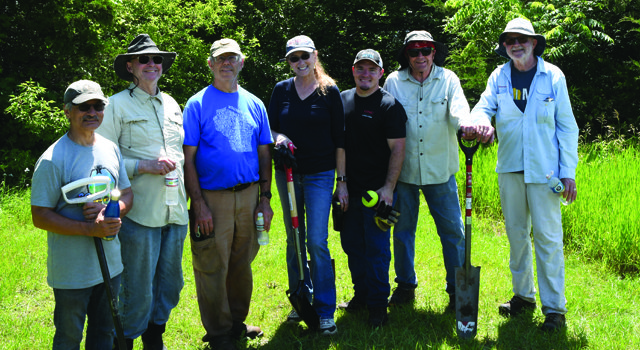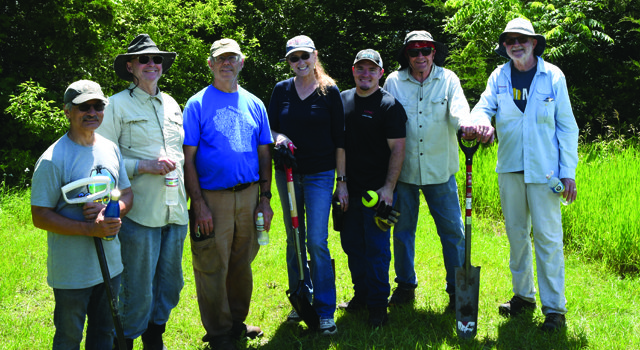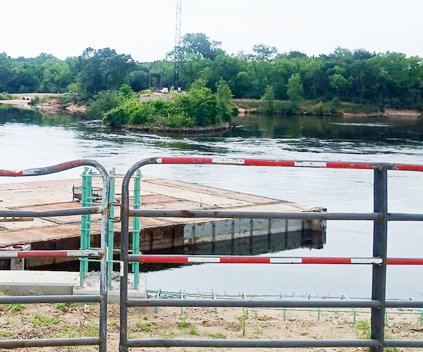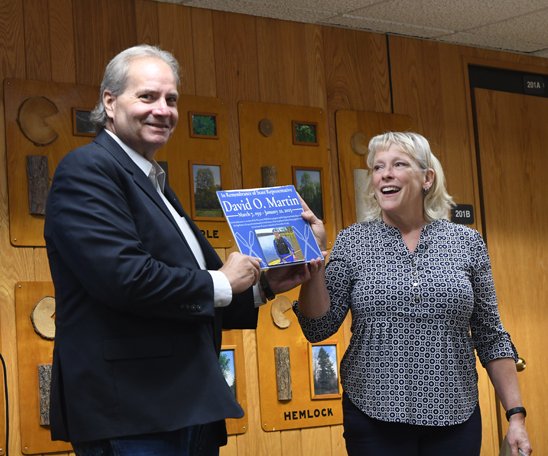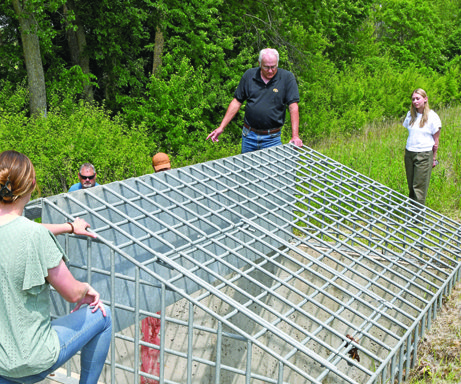Driftless Area counties like Monroe, Vernon and Richland are increasingly looking for ways to increase the resilience of transportation infrastructure, businesses and homes. Monroe County formed their Climate Change Task Force in 2019, and Vernon County formed a Flood Mitigation Alliance in 2020.
Richland County formed the group ‘Richland Resilience’ in 2023, and launched into projects in 2024. The projects include Resilient Land Use, Groundwater Resilience and River Gauges. The full group meets quarterly in Richland Center, and is supported by Southwest Regional Planning Commission (SWRPC) and UW-Madison.
On Friday, June 20, on the Summer Solstice, members of the group gathered at the Frank’s Hill effigy mound site in rural Muscoda. Showing up to tackle removal of invasive species from established prairie plantings were Richland Resilience members Supervisors Steve Carrow and Mark Gill, Three Eagles Foundation vice president Brian McGraw, Julia Henley, Conservation Technician Derrick Warner, Frank Doerre and Tom McKenna.
“The main impetus to form the group came from former Richland County Emergency Management Director Darin Gudgeon,” SWRPC’s Ellen Tyler said. “Others who were involved from the beginning include Brian McGraw, Connie Champnoise, and former Supervisor Melissa Luck.”
Mission and goals
The group defines resilience as “the capability to anticipate, prepare for, respond to, and recover from significant shocks with minim damage to social well-being, the economy, and the environment.”
The mission adopted by the group is: “The Richland Resilience Group is a coalition of local leaders working on projects to build resilient people, infrastructure, businesses, and environment in Richland County.”
Their goals include:
• building resilient people, infrastructure, businesses and the environment
• providing information on resilience to the community and community leaders
• funding resilience projects
• ensuring the ability of the Resilience Group beyond current member horizons.
Land Use
Tyler said that the first project the group tackled was ‘Resilient Land Use,’ and the Richland County Board of Supervisors voted to adopt the recommendations of the group as-presented into their 2024-2034 Comprehensive Plan.
Those recommendations were:
1. Update and Fairly Administer the Zoning Code.
Richland County’s Zoning Department has dealt with staff turnover and prior inconsistency in zoning code administration. With new leadership in the Zoning Department, the opportunity for fair and active administration is critical. The following actions are recommended:
• Address existing noncompliant parcels
• Update the zoning code
• Ensure fair enforcement going forward.
2. Implement the 2022 Richland County Land and Water Resource Management Plan.
A renewed effort is needed, with emphasis on the following points:
• Encourage producers to use cover crops after harvest and reduce tillage frequency or intensity.
• Implement the NR 151 performance standards of farming all cropland to tolerable soil loss rates and having a NRCS 590 nutrient management plan on priority farms/cropland; collaborate with DNR, as necessary
• Assist landowners and producers in converting marginal crop fields to rotational grazing
• Conduct a follow up drinking water well study
• Update manure storage ordinance.
3. Activate Townships.
Townships need to work together to access resources and education for effective stewardship of land. This may include:
• Resource sharing at the Richland County Towns Association, including about Agricultural Enterprise Areas, nature-based flood mitigation, and farmer-led watershed groups.
• The Zoning and Land Conservation Department should establish relationships and provide education around zoning enforcement with county-zoned townships. Within townships, turnover and lack of expertise in zoning cause issues in consistency and compliance for regulating local land use.
4. Grow County-Wide Resilient Land Use Initiatives.
Combining the Richland Resilience Group’s advocacy with Richland County departments’ leadership, implement the following practices:
Zoning and Land Conservation Department:
• Restore entrenched streams to their floodplains
• Promote the installation of conservation practices that prevent water runoff, including vegetative buffer strips and tree planting
• Incorporate natural flood mitigation strategies into new and existing infrastructure projects
• Create ‘9 Key Element Plans’ for all ‘impaired’ watersheds in order to secure grant funding for water quality practices.
• Adopt a ‘cluster’ development ordinance regulating the subdivision of land for residential purposes.
Individual Municipalities:
• Create and update wellhead protection ordinances
• Incorporate resilient infrastructure practices listed below
• Consider adopting Farmland Preservation Zoning for agricultural areas and/or Agricultural Enterprise Areas after consultation with producers.
County Board of Supervisors:
• Undertake proactive planning for climate change impacts including increased rainfall, drought, storms, and severe heat events
• Encourage continued exploration of land use vulnerabilities and opportunities, recognizing that “we don’t know what we don’t know”
• Create and implement an ordinance regulating the use and installation of outdoor lighting to prevent/mitigate the harmful effects of lightpollution.
• Explore opportunities to collaborate with other private and public entities to fund programs that promote climate resiliency
Highway Department:
• Establish a plan for bicycle paths and lanes on county and local roads which connect places of residence, work, education, and leisure activities
• Design and construct infrastructure anticipating impacts of climate change, including increased frequency and severity of rainfall and storm events
• Design and construct infrastructure to connect waterways, streams, wetlands, and wildlife corridors
• Design and construct infrastructure to reduce the amount and velocity of storm water runoff
• Design and construct infrastructure to capture sediment and contaminants from runoff prior to discharge
• Implement policies and practices that minimize the use of salt and other chemical treatments of highways.
5. Empower Farmers to lead resilient land use practices in Richland County.
• Provide education and opportunities for farmer-led watershed groups.
• Ensure compliance with nutrient management plans
• Offer educational opportunities for practices and cost-effectiveness of regenerative practices such as cover crops and no tilling.
• Promote the use of farming practices which reduce the amount and velocity of runoff, and promote soil health and water quality, such as retention areas and buffer strips that utilize native vegetation to remove sediment and contaminants prior to discharge or absorption.
• Pursue private and public funding for programs that pay producers to adopt resilient land use practices.
In 2025, as part of the Land Use Resiliency project, the group organized a meeting to identify producers in the county interested in forming producer-led watershed councils. The watershed group has held several meetings so far, and is holding some field days this summer.
Other projects
SWRPC’s Ellen Tyler said that the other two projects the group is working on – Stream Gauges and Groundwater Resiliency – have also enjoyed an active focus by the group.
“In 2024, the group worked on identifying where stream gauges to monitor rises on rivers and streams are needed in the county,” Tyler said. “We are anticipating an exciting announcement regarding our Groundwater Resiliency project in coming months.”
The next meeting of the group is planned for August in Richland Center.
